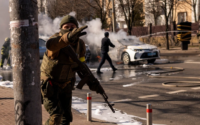The New Cold War Has Made US Liberals Learn To Love the Bomb
In a recent
white paper, the Institute for
Peace & Diplomacy’s Christopher
Mott examines a deep realignment in American political ideology, the
replacement of “the older rationalizations for primacy, hegemony, and interventionism”
with “neo-imperialism with a moral face.” Mott finds that this ongoing
transition reflects changes in ruling class norms. American elites, more connected
than ever with state actors and state power, now see continued U.S. empire,
global dominance, and interventionism as clear moral goods. Elites’ Bush-era
skepticism of American empire seems to be long gone. Mott finds a new revival
of the “Atlanticist tendency to push moralism and social engineering globally.”
As professional elites have converged on the new state-sanctioned ideology,
it has become increasingly important to publicly signal one’s loyalty to it,
which has created a feedback loop that favors continued interventionism.
This realignment has revived Cold War McCarthyism, but with an unexpected twist:
America’s “liberal” party is now at the loud, obnoxious forefront
of denouncing putative traitors and praising the likes of the military, the
FBI and the CIA. In a new
piece for The Atlantic, for example, political scientist Dominic
Tierney makes this realignment explicit, praising the US military as an egalitarian
institution and “the world’s anti-fascist insurance policy.” To Tierney,
in choosing the side of military intervention, American liberals and progressives
have chosen the right side.
It’s hard to imagine on its face. Not so very long ago, a strange
realignment of this kind was almost impossible to conceive. Happenstance and
odd historical contingencies have convinced the American mainstream left (perhaps
center-left) that the military, national security, and intelligence apparatuses
are the people’s servants, steadfast in their dedication to justice and the
rule of law. Russiagate – a batty conspiracy theory founded upon the admittedly
understandable desire to sink Donald Trump – created a strange, although not altogether
unexpected, alignment between educated, urban liberals (whom we might’ve expected
to know better) and a military and intelligence establishment that successive
generations of the real left have warned us about. Their warnings have focused
on the unaccountable power of agencies whose actions seem to be beyond the reach
of our democratic representatives – whose powers extend to spying on and even
murdering American citizens without even the semblance of due process. The kind
of thing, that is, that we might expect liberals to care about, a little bit
if not deeply.
But the Trump realignment has turned anti-authoritarianism
on its head: establishment liberals, reacting to Trump’s anti-Washington, anti-federal
bureaucracy rhetoric (and it was rhetoric only), have positioned themselves
as the defenders of all of America’s military empire and of worst intelligence
and law enforcement bodies in our country’s history. Today, somehow, smart,
educated liberals don’t want to be perceived as resisting the unaccountable
power of the federal government, or of defending individual rights, or of opposing
“humanitarian” interventions abroad.
Is it worth asking about the psychological predicates of such
a shift. The trend Mott’s paper considers is part of a more general one that
has reshaped elite thinking in the United States during the years since Donald
Trump became a major force and influence in American politics. Close consideration
of these psychological conditions reminds of William
M. Arkin’s letter of resignation from his position at NBC News.
Arkin, a real investigative journalist known for challenging
Washington power structures and asking big questions, expressed alarm “at
how quick NBC is to mechanically argue the contrary, to be in favor of policies
that just spell more conflict and more war.” For Arkin, it was baffling
that supposedly liberal elites in the legacy news media would “yearn for
the Cold War” and “lionize” a “historically destructive
institution” such as the FBI. The journalism profession seemed to be judging
positions based on a desire to signal opposition to Trump, rather than on the
merits of argument and evidence. Anyone even the least bit familiar with American
history knows that our government, through bodies like the FBI, the CIA, and
the armed forces, has perpetrated a continuous war against the American people
generally, and the civil rights and civil liberties communities in particular.
If we’re not careful, this new Cold War could surpass the original
in its potential for destruction and harm. Just last month, former CIA official
Graham E. Fuller remarked
on the fanatical Russophobia now gripping the country. Fuller, a Harvard-trained
former Vice Chairman of the National Intelligence Council, observed, “The
bias is extraordinary – I never saw anything like this when I was involved in
Russian affairs during the Cold War.” Americans are at yet another national
moment of reckoning: as we began to react against suicidal interventionism and
empire, elites publicly shifted their weigh and crafted a new ideological paradigm
for “humanitarian intervention.” Let’s not buy it again.
David S. D’Amato is an attorney, businessman, and independent
researcher. He is a Policy Advisor to both the Heartland Institute and the Future
of Freedom Foundation. He has written in Newsweek, Investor’s Business
Daily, RealClearPolitics, The Washington Examiner, and many
other popular and scholarly publications, and his work has been cited by the
ACLU and Human Rights Watch, among others.
[ad_2]
Source link


